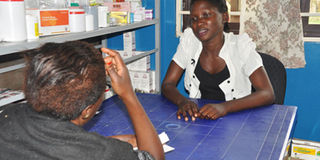Sharing experiences of taking an HIV test

A client at Naguru Teenage Centre undergoing a counselling session. It is important for people intending to have an HIV test to first undergo counselling. photo by rachel mabala
Many factors influence the decision to have an HIV test: curiosity, reassurance of negative status, convenience, worry of exposure to the disease and job opportunity among others.
Similarly, many decline to test for fear of stigmatisation and the perception that they are at a high risk.
Whichever decision you choose health experts say if one is infected, soon or later they will discover it, although it will be painful and too late.
Health experts say widespread testing is one of the best ways in which the HIV epidemic can be controlled. We sought out the experiences of some people who have under taken an HIV test, how they managed to go through it, and what counsellors say.
Emma Kitakule 35, Secondary teacher
“When I first went for a test, I was scared. I was not prepared to test it but our boss demanded and because I feared to lose my job, I accepted. When the lab technician drew blood from me, I run to the canteen and drunk bottles of water but could not stop sweating. I run to the toilet but nothing was coming out. After a while I went to get the results and colleagues were all laughing at me. I pretended to be fine. Fortunately, I was negative. I photocopied my results and distributed to family and friends. That was a turning point.”
Sam Aliu 25, student
“I prayed to God to only give me one chance of being negative. I went praying and I told the counselor that if I am negative, I will abstain until marriage. The results turned out to be negative and since then, I value my life.’’
Sadam Kyeyune, 23, peer educator
“I discovered that I was HIV positive in 2005 after falling sick for a long period of time. As an underage then, I tried to know my status but in vain because the doctors demanded that I bring my parents but they were already dead. I decided to go with my younger brother. They decided to counsel me saying I am not the first and last person to live with the virus. When I decided to disclose to my friends at school, they all run away because they thought I was going to die soon.”
Robinah Babirye 21, Kyambogo university student
“While in primary six, my mother called my twin sister and I to tell us our blood was not good.
She said our red blood cells were weak and we should therefore start taking Septrin to make them strong. Since then, I have never gone for a test but continue to take ARVs. She used to regularly take me for tests but said they were for malaria.
It is not easy living positively, but whenever I have some challenges, doctors support me psychologically. I get free treatment and they refund the transport I use to meet them. I find solace in a music band but still continue to admire people who do not take drugs every day.
I rarely disclose my status for fear of stigma and in any case, it takes a lot of courage for people to accept you are positive. It is okay to live positively, but I wish there could be a cure.”
Counsellors take
Ninah Ayera, an HIV/Aids counsellor at Naguru Teenage Centre says clients who go to test in most cases have or feel signs, have heard gossip about their status or have been persuaded to do so.
“Before a client comes for a test, they must have heard stories of their spouses and they want to confirm,” she says.
She adds: while some have signs, others are people who just want to live responsible lives by knowing their status and they test every three months.”
Because no one wants a positive result, Ayera says a counsellor’s advice helps to tame emotions of the clients before breaking the news. This, she says is the most challenging part.




